
#LuckySinghEnglish
133.74M Views

black
gorgeous
outfit
👗❤️🦢❄️😎👗😎
#BlackOutfit
#SillyPoint
#Rain
#Summer
#LuckySinghEnglish
#Kudiharyanvevaldi
#Food
#Comedy
#Travel
#RanveerSingh
#Lipsync
#TurboTales
#sareenotsorry
#Transition
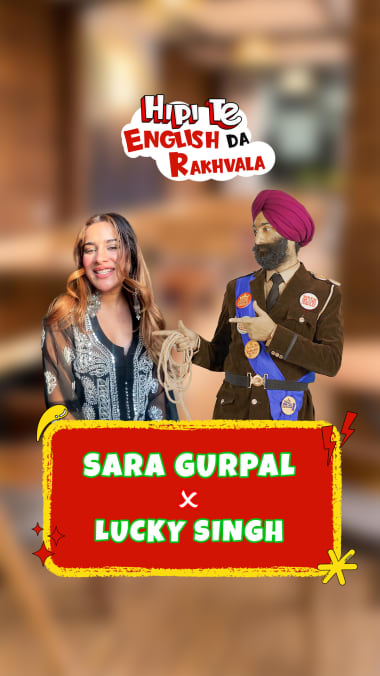
Craziest
rapid
fire
EVER!
Your
favourites,
@saragurpal
&
@LuckySingh
are
here
to
make
your
English
better
in
no
time
😍
Catch
the
new
episodes
of
Lucky
Singh
under
@LuckySingh
on
Hipi!
#HipiKaroMoreKaro
#HipiSpecials
#LuckySingh
#English
#LearnOnHipi
#LuckySinghEnglish
#LearnEnglish
#Hipi
Thank
you
@whizoIndia
for
the
caption.
More
details
on
the
profile
page
#WatchItShopIt
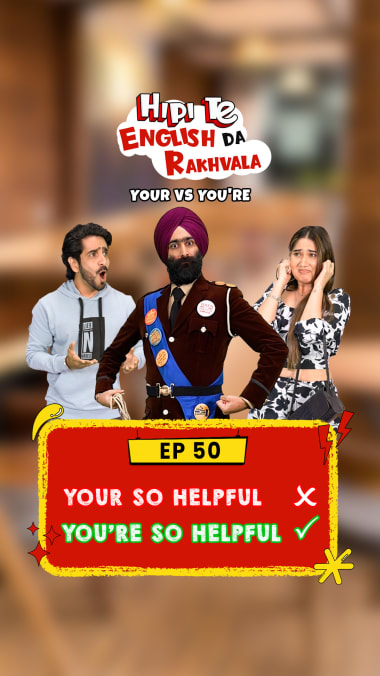
The
punctuation
mark
Apostrophe
is
either
used
to
show
possession/belonging
(apostrophe
-s)
or
to
make
contractions
(are
not
=
aren’t).
Your
v/s
You’re
-
“Your”
shows
possession;
a
relationship
between
nouns,
whereas
“you’re”
is
a
contraction
of
‘you
are’.
What
is
the
difference
between
“its”
and
“it’s”?
Comment
below
👇#HipiKaroMoreKaro
#HipiSpecials
#LuckySingh
#English
#LearnOnHipi
#LuckySinghEnglish
#LearnEnglish
#Hipi
Thank
you
@whizoIndia
for
the
caption.
More
details
on
the
profile
page
#WatchItShopIt
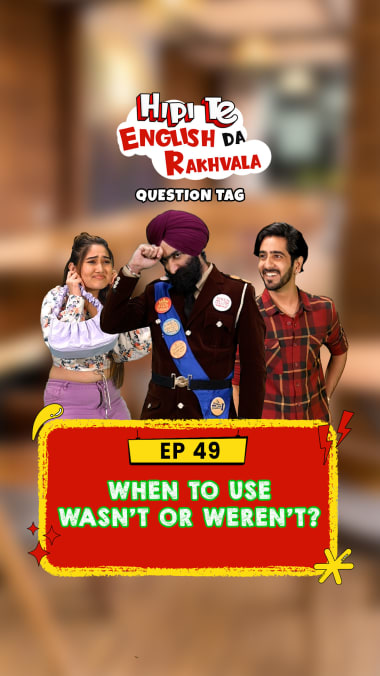
A
question
tag
is
a
very
short
clause
added
at
the
end
of
a
statement
to
change
it
into
a
question.
For
example,
in
'He
is
coming
tomorrow,
isn't
he?',
the
words
'didn't
she'
are
a
question
tag.
We
often
use
question
tags
when
we
expect
the
listener
to
agree
with
our
statement.
In
this
case,
when
the
statement
is
positive,
we
use
a
negative
question
tag
and
vice-versa.
Can
you
put
the
correct
question
tag
in
this
sentence
-
‘Pinky
was
studying
for
her
test,
wasn’t
it?’
Comment
below
👇#HipiKaroMoreKaro
#HipiSpecials
#LuckySingh
#English
#LearnOnHipi
#LuckySinghEnglish
#LearnEnglish
#Hipi
Thank
you
@whizoIndia
for
the
caption.
More
details
on
the
profile
page
#WatchItShopIt
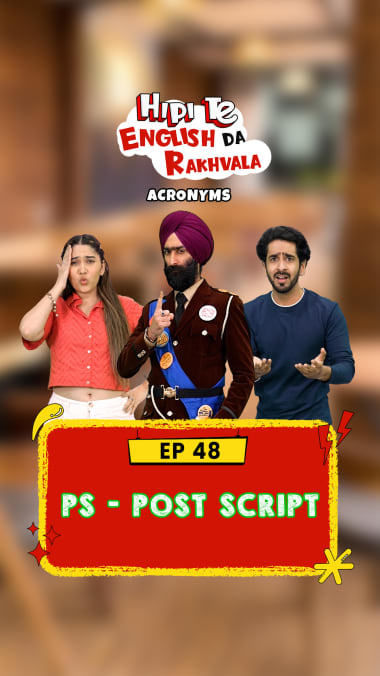
PS
is
the
acronym
of
‘Postscript’
that
is
used
at
the
end
of
letters
and
emails
to
add
extra
information.
Acronyms
are
words
which
are
formed
from
the
first
letters
of
other
words
(eg.,
ATM,
DOB,
FYI).
They
are
different
from
abbreviations
which
are
shorter
spellings
of
words
and
expressions
we
use
every
day
(eg.,
vol,
dept,
impt)
Note:
Acronyms
can
be
used
in
IELTS
Speaking
test,
but
not
abbreviations.
Is
‘Mr.’
an
abbreviation
or
an
acronym?
Reply
below
👇
#HipiKaroMoreKaro
#HipiSpecials
#LuckySingh
#English
#LearnOnHipi
#LuckySinghEnglish
#LearnEnglish
#Hipi
Thank
you
@whizoIndia
for
the
caption.
More
details
on
the
profile
page
#WatchItShopIt
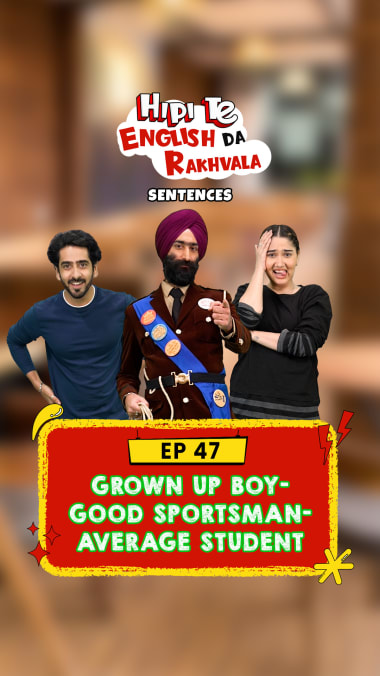
A
run-on
is
a
sentence
in
which
too
many
ideas
are
put
together
without
appropriate
punctuation.
Such
a
sentence
is
grammatically
incorrect.
You
cannot
write
everything
in
a
single
sentence;
one
sentence
represents
one
complete
idea.
Watch
this
video
to
understand
the
correct
formation
of
sentences.
Note:
Avoid
speaking
or
writing
too
many
ideas
connected
with
‘and’.
Instead
break
the
sentences
into
smaller
units,
representing
single
ideas.
How
do
you
practise
improving
your
English
language
skills
daily?
Tell
us
in
the
comments
below
👇
#HipiKaroMoreKaro
#HipiSpecials
#LuckySingh
#English
#LearnOnHipi
#LuckySinghEnglish
#LearnEnglish
#Hipi
Thank
you
@whizoIndia
for
the
caption.
More
details
on
the
profile
page
#WatchItShopIt
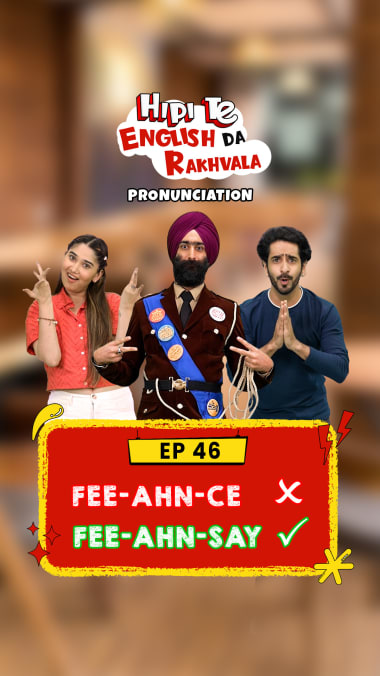
In
English,
the
‘e’
at
the
end
of
most
words
is
generally
not
spoken,
e.g.,
made,
done,
rate,
etc.
However,
‘e’
at
the
end
is
pronounced
in
words
borrowed
from
other
languages
(such
as
French),
e.g.,
fiance,
risque,
macramé,
etc.
In
their
original
language,
all
of
these
words
would
have
an
accent
on
the
last
letter,
making
the
last
consonant-vowel
pair
a
spoken
syllable.
Note:
English
does
not
use
any
markings
on
its
vowels,
as
other
languages
do,
and
so
it
borrows
the
phonetic
sound
without
changing
the
spellings
of
such
words.
Do
you
think
the
final
‘e’
is
pronounced
in
the
word,
‘Recipe’?
Comment
below
👇
#HipiKaroMoreKaro
#HipiSpecials
#LuckySingh
#English
#LearnOnHipi
#LuckySinghEnglish
#LearnEnglish
#Hipi
Thank
you
@whizoIndia
for
the
caption.
More
details
on
the
profile
page
#WatchItShopIt
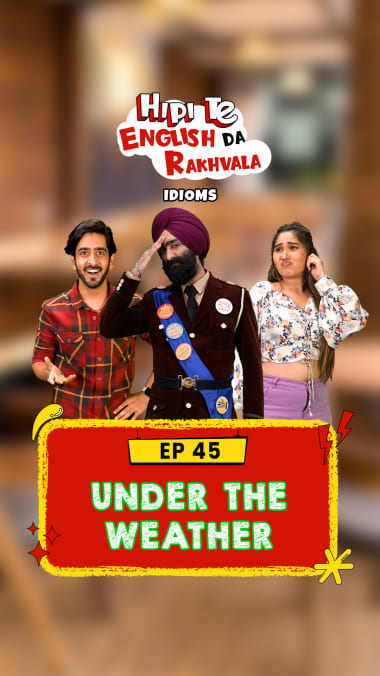
An
idiom
is
a
figurative
expression
having
a
non-literal
meaning.
Watch
this
video
to
learn
the
meaning
of
the
idiom,
‘Under
the
weather’.
What
is
the
meaning
of
the
idiom,
‘A
tiger
cannot
change
its
stripes’?
Comment
below
👇#HipiKaroMoreKaro
#HipiSpecials
#LuckySingh
#English
#LearnOnHipi
#LuckySinghEnglish
#LearnEnglish
#Hipi
Thank
you
@whizoIndia
for
the
caption.
More
details
on
the
profile
page
#WatchItShopIt
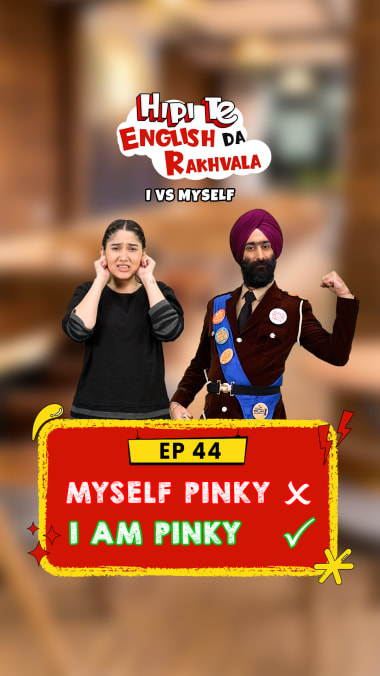
Both
I
and
myself
are
pronouns
but
they
differ
in
a
way
that
‘I’
is
used
as
a
subject,
whereas
‘myself’
is
a
Reflexive
pronoun.
Reflexive
pronouns
like
himself,
herself,
themselves,
oneself,
etc.
refer
back
to
the
same
person
or
something.
We
often
use
them
when
the
subject
and
the
object
of
a
verb
are
the
same.
The
Reflexive
pronoun
‘myself’
works
as
an
object
(receiver
of
the
action),
and
so,
it
cannot
be
used
as
a
subject.
It
always
needs
a
subject
on
which
it
can
reflect
upon.
Can
you
name
some
more
Reflexive
pronouns?
Tell
us
in
the
comments
below
👇
#HipiKaroMoreKaro
#HipiSpecials
#LuckySingh
#English
#LearnOnHipi
#LuckySinghEnglish
#LearnEnglish
#Hipi
Thank
you
@whizoIndia
for
the
caption.
More
details
on
the
profile
page
#WatchItShopIt
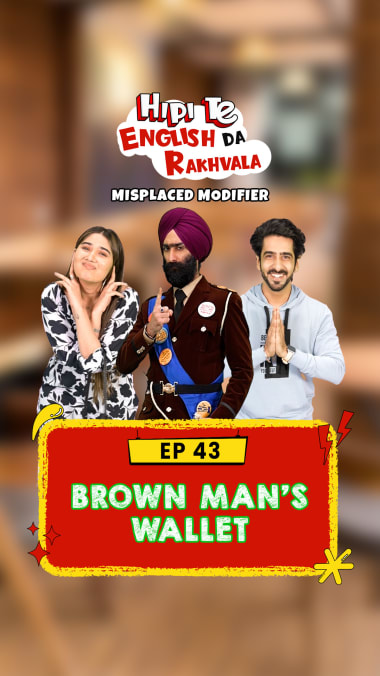
A
misplaced
modifier
is
a
word
or
phrase
that
is
improperly
separated
from
the
word
it
modifies
or
describes.
Because
of
the
separation,
sentences
with
this
error
often
sound
awkward,
ridiculous,
or
confusing.
Rule:
Place
the
modifiers
close
to
the
word
they
modify.
Can
you
provide
the
correct
version
of
this
sentence:
We
ate
the
dinner
we
had
bought
slowly.
Comment
below
👇#HipiKaroMoreKaro
#HipiSpecials
#LuckySingh
#English
#LearnOnHipi
#LuckySinghEnglish
#LearnEnglish
#Hipi
Thank
you
@whizoIndia
for
the
caption.
More
details
on
the
profile
page
#WatchItShopIt
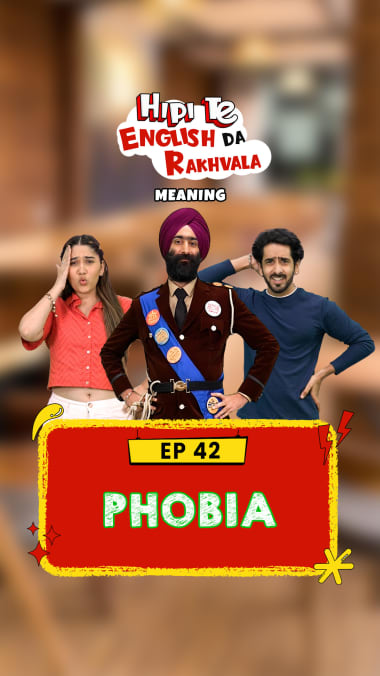
A
root
word
is
the
most
basic
part
of
the
word.
Learning
root
words
is
a
good
way
of
remembering
the
meaning
of
difficult
words,
hence
developing
an
expansive
vocabulary.
‘Phobia’
is
one
root
word
which
is
attached
to
various
syllables
making
different
words.
Watch
this
video
to
learn
its
meaning
and
usage.
What
is
the
meaning
of
the
root
word
‘bio’?
Can
you
give
an
example
of
a
word
made
with
it?
Reply
below
👇#HipiKaroMoreKaro
#HipiSpecials
#LuckySingh
#English
#LearnOnHipi
#LuckySinghEnglish
#LearnEnglish
#Hipi
Thank
you
@whizoIndia
for
the
caption.
More
details
on
the
profile
page
#WatchItShopIt
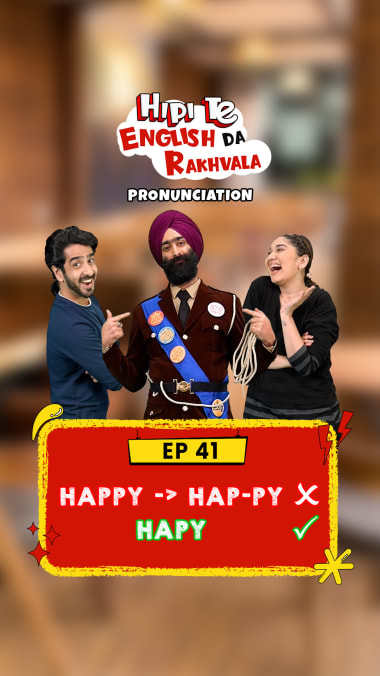
A
lot
of
non-native
speakers
of
English
think
that
words
with
double
consonants
like,
happy
are
pronounced
as
and
/hap-py/.
It
must
be
noted
that
in
the
English
language,
the
double
consonants
are
blended
into
a
single
consonant.
Watch
this
video
to
learn
the
correct
pronunciation
of
‘happy’.
Aware
of
more
such
common
spoken
English
mistakes?
Tell
us
in
the
comments
below
👇#HipiKaroMoreKaro
#HipiSpecials
#LuckySingh
#English
#LearnOnHipi
#LuckySinghEnglish
#LearnEnglish
#Hipi
Thank
you
@whizoIndia
for
the
caption.
More
details
on
the
profile
page
#WatchItShopIt